Aug. 28 to Sept. 3
Chen Shu-chu (陳樹菊) had never heard of Time magazine when it named her as one of its 100 most influential people of 2010. It was director Ang Lee (李安) who recommended her — though she also had no idea who he was.
“I never understood why they chose me,” the noted philanthropist states in her 2011 biography, Sensational Kindness (不凡的慷慨) by Liu Yung-yi (劉永毅). “I’m just a regular, insignificant vegetable vendor ... There are countless people who are more famous than me, and who have donated 10, 20 or even 100 times more money than me.”
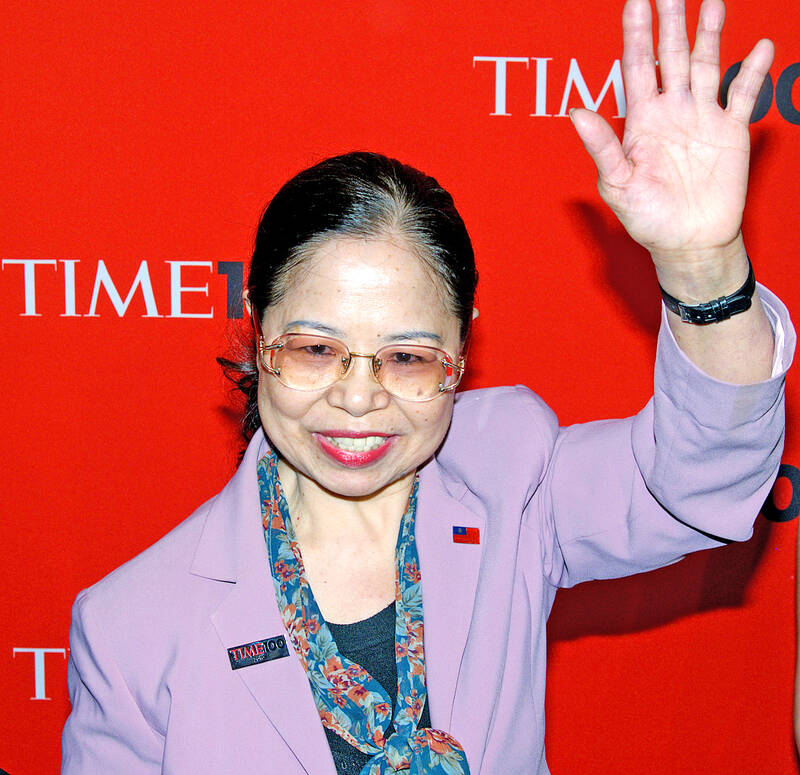
Photo courtesy of David Shankbone
Overcoming a destitute childhood where she was forced to quit school at the age of 13 to sell vegetables while taking care of five siblings, Chen initially just wanted to silently pay forward the kindness that she received over the years. But after the Liberty Times (Taipei Times’ sister paper) uncovered her deeds around 2005, her profile blew up.
“I never told anyone about what I was doing because it was my personal business,” she says. “All of a sudden, everybody knows.”
Chen retired in 2018 due to poor health after more than 50 years running her stall in Taitung’s Central Market, but she continued to give to society. To honor her mother who died giving birth to her younger brother, she donated NT$15 million in 2021 to help pregnant women in need and support children who have lost their mothers in childbirth.
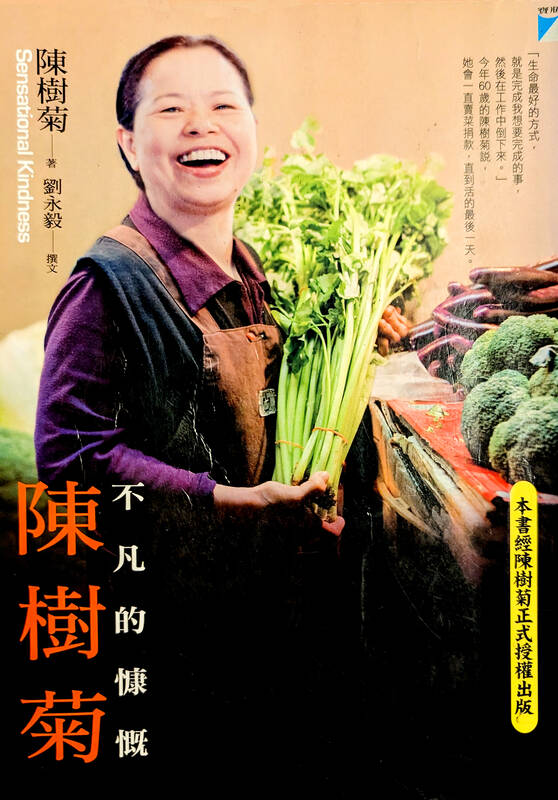
Photo courtesy of Taipei Public Library
In addition to numerous honors and awards, Asteroid 278986, discovered at Nantou’s Lulin Observatory in 2008, was named after her in 2018.
FAMILY TRAGEDIES
Born in Yunlin County, Chen moved with her family to Taitung when she was seven years old. The family of six rented a thatched hut in their new home and sold vegetables for a living. Two more children were born in the next five years. Although they didn’t have much, Chen’s life was relatively worry-free until she graduated from primary school. Things even seemed to look up, as the family won a lot drawing for the most coveted stall in the newly completed Taitung Central Market.
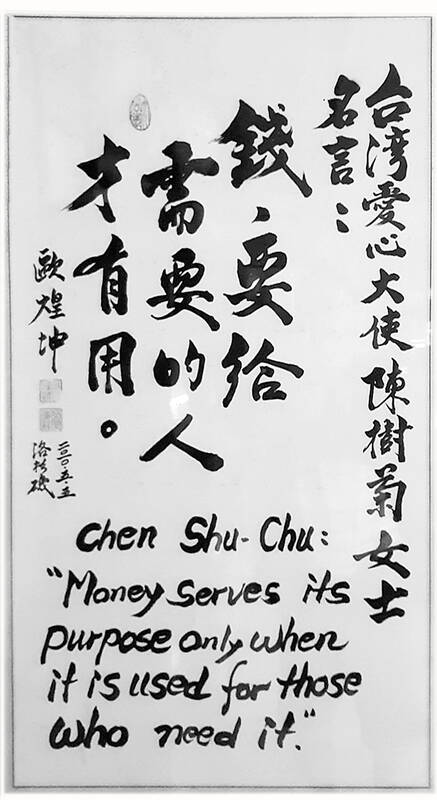
Photo: Huang Ming-tang, Taipei Times
But Chen’s mother just managed the stall for a few weeks before she died giving birth to her seventh child. Since the baby was too large, the birth required a C-section, which the family could not afford. By the time her father managed to borrow enough cash, it was too late.
This tragedy dashed Chen’s plans of attending junior high school, and she began working at the family’s vegetable stall and helping raise her siblings. Money was tight and it became her daily task to figure out how to use what they had to feed everyone, even if it meant that she didn’t get to eat.
The family’s misfortune continued, when one her younger brothers fell ill at the age of 11. The local doctors could not diagnose his sickness and recommended they take him to National Taiwan University Hospital. Her father failed to borrow money from relatives, and finally the brother’s teacher saved them by launching a schoolwide fundraising campaign. Chen’s brother didn’t make it in the end, but this event planted the seeds of philanthropy in her heart.
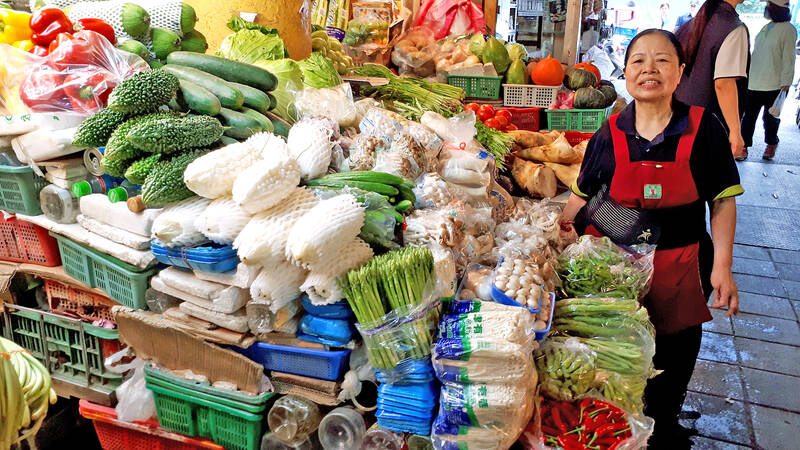
Photo: Huang Ming-tang, Taipei Times
BOOMING BUSINESS
After her brother’s death, Chen was determined to make as much money as she could so the family would never be unable to pay for medical treatment again.
She made changes to the business model and worked grueling hours, often being the first to arrive and last to leave the market and taking just one day off per year. She developed the habit of sleeping on the floor so she would wake up early, and even when she traveled to the US to receive her honors she still slept on the floor at the hotel.
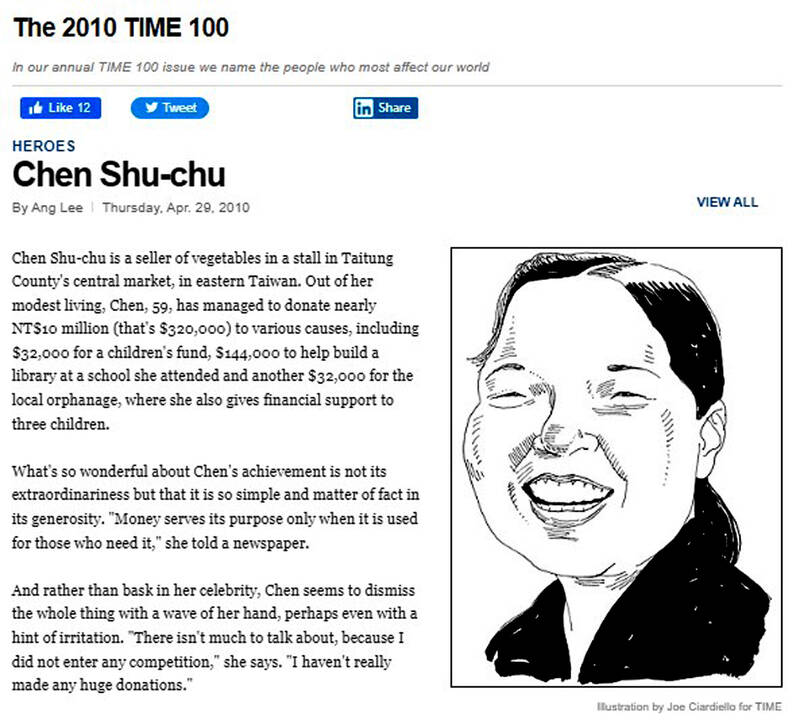
With her business acumen, Chen put her siblings through high school and university. She had put aside some extra cash to buy some nice clothes and eat a fancy meal, but she found that she had little desire for material comforts. Her savings grew.
Whenever people asked why she worked so late, however, Chen answered that there was nobody to go home to anyway. She was about to marry her first boyfriend when her father asked if they could delay the wedding until her siblings were older. He agreed, but a week later he married someone else.
“I lost faith and interest in marriage after that,” she says.
A fortune teller told her she would have three children, however, and when Chen bought a house she kept three extra rooms for them. They remained empty. But she also practically raised her three nephews.
Chen’s business received a major boost when troops from Green Island realized that it was cheaper to buy from her than to have vegetables shipped there. Through investing her savings, she achieved considerable financial security.
Accustomed to living frugally, Chen found that she had little use for the money herself. Despite developing all sorts of health problems, she continued to toil at the market.
“I just saw my physical pains as debts I had to pay back in this life,” the devout Buddhist said. “I believe that when I no longer owe anyone and nobody owes me, then everything will resolve itself. Plus, I still have a mission to complete, so before that, no matter how much I am suffering, I will clench my teeth and carry on.”
HAPPINESS IN GIVING
Chen’s surviving siblings had started their own families and lived comfortably, so she believed that she had fulfilled her duty. She didn’t want her wealth to cause any family disputes, so she declared early on that they wouldn’t receive any of it.
“I might as well give the money to people who actually need it,” she says.
Shortly after her father’s death in the early 1990s, Chen donated NT$1 million to Fo Guang Shan monastery. But after seeing some monks behaving blasphemously, she decided to give directly to the needy. In 1996, she started sponsoring kids annually at the Kids Alive children’s home in Taitung, and later gave the organization NT$1 million.
For a long time, Chen could not sleep well. She often stayed up crying while her thoughts raced, and when she felt especially lonely she would go weep at her mother’s grave in the middle of the night. This changed when she began helping children.
“Every time I saw those children’s smiles, my heart opened up. From within came an indescribable, rich happiness, and from then on I was always able to sleep deeply and soundly,” she says. “I’m glad that money can bring such wonderful feelings. I never wanted anything back for my deeds. Being able to sleep well is the best reward.”
To thank Jen-ai Elementary School (仁愛國小) for raising funds for her sick brother back in the day, she gave NT$550,000 to help students in crisis and to build a library.
It was through this library donation that Liberty Times reporter Huang Ming-tang (黃明堂) learned of Chen’s name and found out about her philanthropy. Chen refused to be interviewed at first, but eventually relented and her story made the front page in 2009.
One day, a particularly large media scrum showed up at her stall — it turns out she was named one of 48 “heroes of philanthropy” by Forbes magazine. She barely had time to digest the news when they showed up again two days later for Time magazine’s selection.
The government urged her to go to the US to receive the award. After much prodding, Chen reluctantly went. She finally had a chance to wear for the first time some of the nice clothes she had bought years previously.
Despite becoming a local celebrity, she could only think of going back to work so she could make more money to give away. She didn’t even take a day off after returning home, showing up at her vegetable stall the next day.
Taiwan in Time, a column about Taiwan’s history that is published every Sunday, spotlights important or interesting events around the nation that either have anniversaries this week or are tied to current events.

Jacques Poissant’s suffering stopped the day he asked his daughter if it would be “cowardly to ask to be helped to die.” The retired Canadian insurance adviser was 93, and “was wasting away” after a long battle with prostate cancer. “He no longer had any zest for life,” Josee Poissant said. Last year her mother made the same choice at 96 when she realized she would not be getting out of hospital. She died surrounded by her children and their partners listening to the music she loved. “She was at peace. She sang until she went to sleep.” Josee Poissant remembers it as a beautiful

For many centuries from the medieval to the early modern era, the island port of Hirado on the northwestern tip of Kyushu in Japan was the epicenter of piracy in East Asia. From bases in Hirado the notorious wokou (倭寇) terrorized Korea and China. They raided coastal towns, carrying off people into slavery and looting everything from grain to porcelain to bells in Buddhist temples. Kyushu itself operated a thriving trade with China in sulfur, a necessary ingredient of the gunpowder that powered militaries from Europe to Japan. Over time Hirado developed into a full service stop for pirates. Booty could

Lori Sepich smoked for years and sometimes skipped taking her blood pressure medicine. But she never thought she’d have a heart attack. The possibility “just wasn’t registering with me,” said the 64-year-old from Memphis, Tennessee, who suffered two of them 13 years apart. She’s far from alone. More than 60 million women in the US live with cardiovascular disease, which includes heart disease as well as stroke, heart failure and atrial fibrillation. And despite the myth that heart attacks mostly strike men, women are vulnerable too. Overall in the US, 1 in 5 women dies of cardiovascular disease each year, 37,000 of them

Before the last section of the round-the-island railway was electrified, one old blue train still chugged back and forth between Pingtung County’s Fangliao (枋寮) and Taitung (台東) stations once a day. It was so slow, was so hot (it had no air conditioning) and covered such a short distance, that the low fare still failed to attract many riders. This relic of the past was finally retired when the South Link Line was fully electrified on Dec. 23, 2020. A wave of nostalgia surrounded the termination of the Ordinary Train service, as these train carriages had been in use for decades